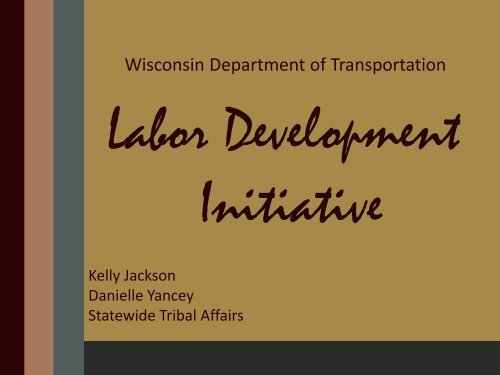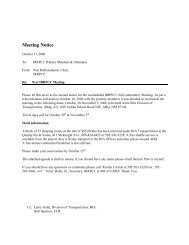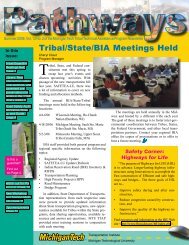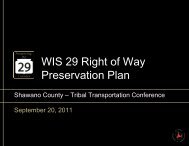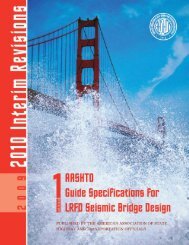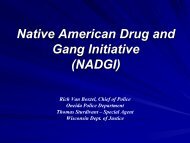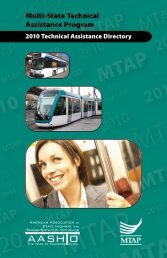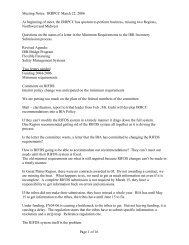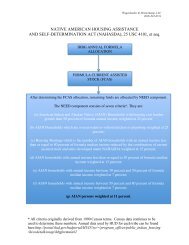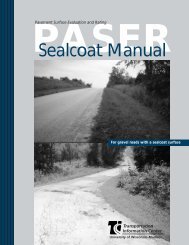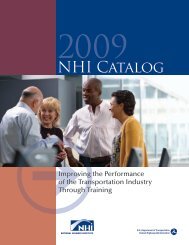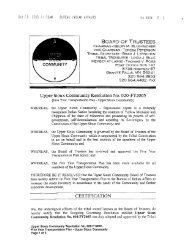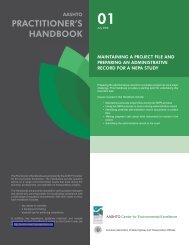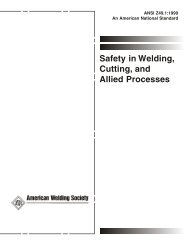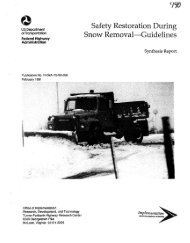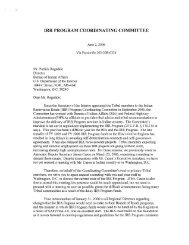Kelly Jackson, Statewide Tribal Liaison
Kelly Jackson, Statewide Tribal Liaison
Kelly Jackson, Statewide Tribal Liaison
You also want an ePaper? Increase the reach of your titles
YUMPU automatically turns print PDFs into web optimized ePapers that Google loves.
Wisconsin Department of Transportation<br />
Labor Development<br />
Initiative<br />
<strong>Kelly</strong> <strong>Jackson</strong><br />
Danielle Yancey<br />
<strong>Statewide</strong> <strong>Tribal</strong> Affairs
Presentation Overview<br />
• Federal and state guidance<br />
• <strong>Tribal</strong> Affairs Initiatives<br />
• Native American Labor Development<br />
• Discussion
Federal Guidance<br />
• United States Constitution – Article 1,<br />
Section 8, Clause 3<br />
To regulate Commerce with foreign<br />
Nations, and among the several States,<br />
and with the Indian Tribes
Federal Guidance<br />
• Executive Order 13175 - Coordination &<br />
Consultation with Indian <strong>Tribal</strong><br />
Governments (2000 & 2009)<br />
• Executive Order 13502 – Use of Project<br />
Labor Agreements for Federal<br />
Construction Projects (2009)<br />
– FHWA 1273 Part II Non-Discrimination
Federal Guidance<br />
23 United States Code – Section 140<br />
Non-Discrimination<br />
(d) Indian Employment and Contracting.- Consistent<br />
with section 703(i) of the Civil Rights Act of 1964 (42 U.S.C.<br />
2000e-2(i), nothing in this section shall preclude the<br />
preferential employment of Indians living on or near a<br />
reservation on projects and contracts on Indian reservation<br />
roads. States may implement a preference for employment of<br />
Indians on projects carried out under this title near Indian<br />
reservations. The Secretary shall cooperate with Indian tribal<br />
governments and the States to implement this subsection.
State Guidance<br />
• Executive Order 39 - Affirmation of the<br />
government-to-government relationship<br />
between the State of Wisconsin and<br />
Indian <strong>Tribal</strong> Governments located within<br />
the state of Wisconsin (2004)
State Guidance<br />
Partnership Agreement (October 2010)<br />
• First of its kind agreement that creates and defines<br />
the processes by which WisDOT and the Wisconsin<br />
Division-Federal Highway Administration (FHWA)<br />
work in collaboration with tribes on transportation<br />
related issues.<br />
• Includes guiding principles, issue/dispute resolution<br />
process, and emphasis areas and measurable<br />
achievements.<br />
• Originally signed in May of 2005 and resigned in<br />
October of 2010.
WisDOT <strong>Tribal</strong> Affairs<br />
Partnership Agreement Core Emphasis Areas<br />
• Partnership<br />
• Transportation Safety<br />
• Economic Development<br />
• Building Business Capacity<br />
• Native American Labor Development<br />
• Training<br />
• Cultural Resources
WisDOT <strong>Tribal</strong> Affairs<br />
Secretary’s Annual Consultation<br />
• The annual consultation meeting with the Secretary of<br />
WisDOT provides an opportunity for tribal leaders and<br />
representatives to express concerns, highlight issues<br />
and make recommendations regarding statewide tribal<br />
affairs.
WisDOT <strong>Tribal</strong> Affairs<br />
<strong>Tribal</strong> Task Force<br />
• Created as a result of the Partnership Agreement and serves as an<br />
advisory and policy advisory committee on transportation related<br />
issues affecting tribes.<br />
• Funded by WisDOT through a Memorandum of Agreement (MOA)<br />
with the College of the Menominee Nation. Meetings are held on<br />
a bi-monthly basis.<br />
• Membership consists of WisDOT agency representatives, federal<br />
agency representatives and tribal designees that are appointed by<br />
each respective tribal government.<br />
• Responsible for creating an annual work plan that measures the<br />
achievement of goals as outlined in the partnership agreement.
<strong>Tribal</strong> Affairs Team<br />
• <strong>Kelly</strong> <strong>Jackson</strong>, <strong>Statewide</strong> <strong>Tribal</strong><br />
<strong>Liaison</strong><br />
Phone: (608) 266-3761<br />
Email: kelly.jackson@dot.wi.gov<br />
• Danielle Yancey, <strong>Tribal</strong> <strong>Liaison</strong><br />
Phone: (608) 261-0131<br />
Email: danielle.yancey@dot.wi.gov<br />
• Sandy Stankevich, North Central<br />
Region <strong>Tribal</strong> <strong>Liaison</strong><br />
Phone: (715) 365-5784<br />
Email: sandy.stankevich@dot.wi.gov<br />
• Brent Pickard, Northwest Region<br />
<strong>Tribal</strong> <strong>Liaison</strong><br />
Phone: (715) 836-4623<br />
Email: brent.pickard@dot.wi.gov<br />
• Derek Weyer, Northeast Region <strong>Tribal</strong><br />
<strong>Liaison</strong><br />
Phone: (920) 492-0139<br />
Email: derek.weyer@dot.wi.gov<br />
• Roger Larson, Southwest Region <strong>Tribal</strong><br />
<strong>Liaison</strong><br />
Phone: (608) 246-7916<br />
Email: roger.larson@dot.wi.gov<br />
• Andrew Malsom, Southeast Region <strong>Tribal</strong><br />
<strong>Liaison</strong><br />
Phone: (262) 521-5354<br />
Email: andrew.malsom@dot.wi.gov
Native American Labor<br />
Development<br />
“Work will focus on tribal and Transportation agency<br />
staff, ensuring that all is done to cooperatively<br />
ensure that work in Indian Country complies with<br />
tribal codes to the extent applicable; promotes<br />
<strong>Tribal</strong> employment through training-based<br />
initiatives and joint partnerships; and sustains,<br />
promotes, and expands Native American hiring.<br />
[Note: WisDOT does not have statutory authority to<br />
impose and enforce TERO and other hiring preferences<br />
on WisDOT contracts.]”<br />
- Partnership Agreement, October 2010
What is TERO?<br />
Native American Labor<br />
Development<br />
• <strong>Tribal</strong> Employment Rights Ordinance<br />
(TERO)<br />
– Preference hiring goals<br />
– TERO tax<br />
– More than 300 Indian tribe and Alaska native<br />
village governments have TERO offices.<br />
(2008)
Native American Labor<br />
Development<br />
23 United States Code – Section 140<br />
Non-Discrimination<br />
(d) Indian Employment and Contracting.- Consistent<br />
with section 703(i) of the Civil Rights Act of 1964 (42 U.S.C.<br />
2000e-2(i), nothing in this section shall preclude the<br />
preferential employment of Indians living on or near a<br />
reservation on projects and contracts on Indian reservation<br />
roads. States may implement a preference for employment of<br />
Indians on projects carried out under this title near Indian<br />
reservations. The Secretary shall cooperate with Indian tribal<br />
governments and the States to implement this subsection.
Native American Labor<br />
Development<br />
• WisDOT Office of General Council<br />
determined that:<br />
1. A state agency must find authority within<br />
state statutes to enforce a hiring<br />
preference program<br />
2. Authority does not exist<br />
• Developed the Native American Hiring<br />
Provision in lieu of TERO/Indian hiring<br />
preference
Native American Labor<br />
Development<br />
Native American Hiring Provision<br />
– STSP (Standardized special provision) 107-200<br />
– “Encourages and promotes the hiring of Native<br />
Americans on transportation construction projects that<br />
are located ‘on’ or ‘near’ reservations”<br />
– “On” or “near” reservation is defined by the tribal<br />
government (based on county)<br />
– Labor representative is identified the tribal government<br />
to serve as primary point of contact for contractors<br />
– NAHP hiring tracking form (DT2405)
Native American Labor<br />
Development<br />
Stakeholders Focus Group<br />
– <strong>Tribal</strong> leaders and labor representatives<br />
– Industry (WTBA, AICCW, Unions)<br />
– WisDOT management and staff
Native American Labor<br />
<strong>Tribal</strong> Labor Peer Exchange<br />
– Participants: WisDOT <strong>Tribal</strong> Task Force, <strong>Tribal</strong><br />
labor representatives, TrANS Coordinators,<br />
FHWA, AICCW<br />
– <strong>Tribal</strong> Affairs overview<br />
– Information exchange<br />
– TrANS presentation<br />
– Networking<br />
Development<br />
– Open discussion/issues
Native American Labor<br />
Development<br />
Transportation Alliance for New Solutions (TrANS)<br />
“public-private model for collaboration and<br />
success in preparing women, minorities and other<br />
individuals with skills needed to gain access to<br />
the road-building industry as laborers and<br />
apprentices”<br />
– College of the Menominee Nation<br />
– Forward Services
Incentives<br />
Native American Labor<br />
Development<br />
– ASP 1 provides a $5.00 reimbursement payment per<br />
hour for contractors to hire TrANS graduates<br />
– Employers of American Indians may be eligible to<br />
claim the Indian employment credit: (Form 8845).<br />
Qualified employees meet all three of the following:<br />
• Enrolled member, spouse of an enrolled member of an<br />
Indian tribe.<br />
• Substantially all services performed by employee for<br />
employer are performed within an Indian reservation.<br />
• Employee’s principal residence while performing services is<br />
on or near the reservation.
Native American Labor<br />
Development<br />
National Summer Transportation Institute (NSTI)<br />
“designed to introduce secondary school<br />
students to all modes of transportation careers<br />
and encourage them to pursue transportationrelated<br />
courses of study at the college/university<br />
level.”<br />
- College of the Menominee Nation<br />
- Lac Courte Oreilles Objibwa Community College
Thank You!<br />
Questions/Concerns/Issues<br />
Contacts:<br />
<strong>Kelly</strong> <strong>Jackson</strong><br />
Office|608-266-3761<br />
Email| kelly.jackson@dot.wi.gov<br />
Danielle Yancey<br />
Office| 608-261-0131<br />
Email| danielle.yancey@dot.wi.gov


